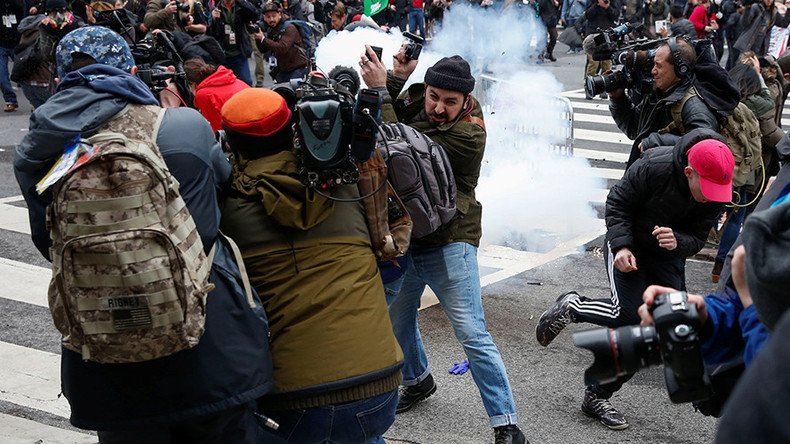DOJ's access to anti-Trump Facebook accounts challenged

The government’s request for complete access to Facebook accounts linked to the anti-Trump inauguration protests has been challenged by the ACLU, which accuses the DOJ of an “unjustified invasion of privacy”violating the First and Fourth Amendments.
The Department of Justice sought warrants for three anti-Trump Facebook accounts, as part of its probe into the large protests on inauguration day, in which mass arrests were made and more than 200 people were charged with felony rioting.
Neither Lacy MacAuley, Legba Carrefour or Emmelia Talarico, who owns the DisruptJ20 (now Resist This) page, were charged with inauguration day-related offences, however.
The American Civil Liberties Union (ACLU) DC is fighting to limit the “unreasonable” search warrants seeking access to the protesters’ Facebook accounts. “Most of the material demanded bears no relation to the government investigation,” it explained in its filing to DC Superior Court Thursday.
A gag order – preventing Facebook from informing its users that they were under investigation – was placed on the warrants when they were obtained in February. However, Facebook fought it and the case was dropped by the government on September 14, allowing those targeted to be informed.
#AntiTrump#InaugurationDay protests broke out across #US and around the globe (VIDEOS, PHOTOS) https://t.co/XrLdMgpwoopic.twitter.com/W2y9gU83sg
— RT America (@RT_America) January 21, 2017
The DOJ requested Facebook allow them access to the entire contents of the three Facebook accounts. This includes all communications, all searches made within Facebook, users’ privacy settings, passwords, credit card details, details on the use of any Facebook apps and any deleted data.
The warrant also seeks records of all Facebook accounts linked to the DisruptJ20 page, meaning those who interacted with or liked the page, estimated to be about 6,000 at the time of the protests.
Access to the DisruptJ20 page would also allow the government to see non-public lists of attendees at events, including a dance party to protest Vice President Mike Pence’s anti-LGBTQ views.
“Permitting government officials to comb through 90 days’ worth of personal messages concerning political activity and associations — some of which are aimed at protesting the policies of the very administration on whose behalf the government officials would be acting in searching Intervenors’ records — is an unjustified invasion of privacy hearkening back to the ‘general warrants’ that the Fourth Amendment was enacted specifically to prohibit,” the ACLU said.
#Trump condemns KKK & neo-Nazis after #Charlottesville statement backlash - White House https://t.co/uWHlM9GjPO
— RT (@RT_com) August 14, 2017
The group added that enforcing those warrants would “chill future online communications” of activists and those who talk to them, “as they will learn that no Facebook privacy setting can protect them from government snooping.”
The group accused the government of violating the First (free speech) and Fourth (protection against unreasonable searches and seizures) Amendments.
“The Fourth Amendment prohibits ‘exploratory rummaging’ by the government in a person’s digital information, particularly when First Amendment-protected political and associational material is implicated,” the ACLU said.
The government has requested data going back to November 1, 2016, just before the presidential election, up to February 9.
#ACLU no longer supports hate groups ‘armed to the teeth’ with guns during rallies https://t.co/oOMpKpaFoZ
— RT America (@RT_America) August 19, 2017
“The warrants make no provision for avoiding or minimizing intrusions into personal and associational/expression information, for preventing such information from being shared widely within the government, or for destroying irrelevant material when the investigation is concluded,” the ACLU added.
The government has already attempted to gain access to 1.3 million IP addresses of people who visited the DistruptJ20 website. The website’s host provider, DreamHost, fought the request in court.
The DoJ was forced to amend its demand to no longer seek the digital address of visitors and the unpublished posts on the site. The Superior Court of DC ruled the government must also explain how the information will be used and demonstrate how they will not share the information with other government agencies – an order which the DoJ is appealing.













